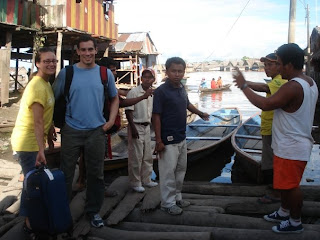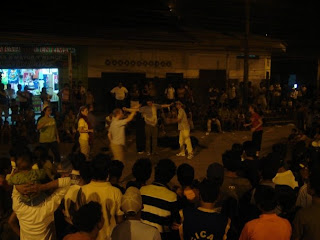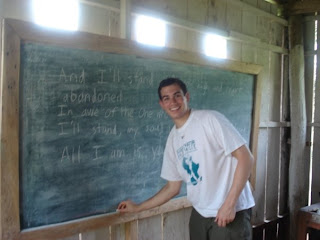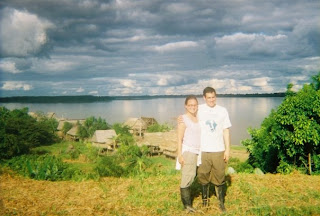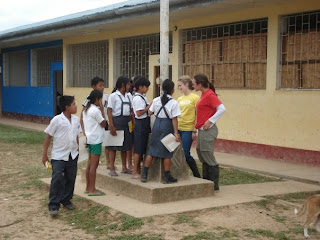The air was thick with humidity and dust and our energy levels were not 100%,

but it felt good to run. We turned left out of the base, crossed an intermittently busy street when sidewalks ran out, and turned down a residential side street for a change of scenery. Houses changed from fairly nice to more simple as the road changed from paved to a single concrete sidewalk to packed, bumpy dirt. Soon we were in slums like Belen. Interestingly, the dogs also became more shabby and menacing, and for the first time I feared for my safety as a dog barked, growled, then chased us for a minute. People still seemed friendly and returned smiles and greetings of "Buenos dias," but these dogs knew no manners. We passed acrid smelling waste, a bustling lumber shop, and a bridge over a small stream with a gorgeous view of a verdant marsh and stilted houses in the distance. We turned around at a church with about 10 dogs outside.
Back at base, the cold shower felt great (there is no warm water in Iquitos), although I was still sweating as I dressed and joined the team for breakfast. At 8:30 we took motocars down a bumpy dirt road to share the gospel with a local prison. For reasons unbeknownst to me, we had to wear khakis and polos, the women in skirts. Barbed wire topped 20 foot walls, where we lined up and provided passports to gain admittance. Outside, we met the pastor responsible for the prison ministry, a large man, moustached with glasses and a big friendly voice. We knocked on a big metal door and a small panel slid open with surreptitious eyes looking out. Inside, guards wore black Under Armour-like shirts with the Peruvian crest on the front left breast pocket and "Policia Nacional" in white on the back, baggy pants with a subtle camo pattern, and black combat boots. They looked intelligent, powerful, and authoritative.
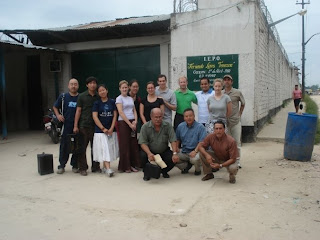
We followed an officer through a cafeteria area, saw almost all men, but some women, across a variety of ages although predominantly 30-45. They wore tank tops, jerseys, T-shirts, athletic shorts, rubber flip-flops, with no commonality. A futbol match was underway on a small concrete pitch, surrounded on three sides by 10 rows of benches, where we sat and waited for instruction. Across the field were the cell blocks, which oddly resembled the slum markets in Belen, with plastic tarps and metal roofs covering narrow paths. A church steeple rose above the walls to the left. The pastor went onto the field and made a few announcements, ending the game, and invited us down to the yard.
I had the guitar ready, and led "Cambiare mi Tristeza" (I'm Trading my Sorrows), then we did Shackles, then I gave my testimony, focusing on how poor decisions in my youth nearly ruined me and it is only by God's grace that I am alive. I introduced Doors, after which Mark gave the gospel presentation. As we ministered to men that came up, Carlos gave his testimony, a remarkable story of how he turned from drug trafficking in the US, spending a few years in prison, to give his life fully to God.

Danielle and I talked with a group of seven or eight men, walked through the tract, and prayed for their salvation. We spoke at length with two men, one stout with a bulbous nose and curly hair, the other skinny, shorter, with a tank top, both very open. The bigger guy tearfully said that Christians are mocked and viewed as weak by other inmates, then asked for a stack of tracts to give out in his cell block. This blew me away.
I then had my best conversation in Spanish of the trip, simply because he kept trying long after it became awkward. He said that he was a Christian and wanted to know more about God, but there were no Bibles available. I had no solution, but committed to finding a way to get Bibles for those that wanted them. Danielle and I also spoke for a while with a muscular guy with curly hair just short of his shoulders named Alex. He said that he would be free next week and asked where he should go to church. Others said they had a year or longer to go, and sentencing seemed to be a random process with little justice.
Outside, the pastor thanked us, and we him, and we returned to the base to put on shorts for a spell before we returned to the Yellow Rose of Texas to save Cecy from the chore of cooking. I had a fried alligator steak with yucca fries and potatoes in a creamy green sa

uce. Restaurants in Peru feel no obligation to serve the entire table at once, so while I waited about 15 minutes beyond the others, I helped Juanita with her ceviche (
http://en.wikipedia.org/wiki/Ceviche), fresh fish "cooked" in a lemon juice marinade. It was delicious, with bright citrus flavor and cilantro that popped, but I had no idea if it was safe.
Back at base, I put on the same dirty Carhardt pants I had worn to Belen all week, since I had no other pants and there were plenty of other smells there to serve as a distraction. We got in a large canoe to go to a new area, but the weight of our crew beached the boat, and we had a jump and lean for a few minutes to get moving.

Dogs barked viciously from floating houses while children swam the butterfly in the waste-ridden water.
We landed in the bright sun and saw a school across a grass-patched field of mud and bumps.

Curious kids greeted us and we invited the neighborhood house by house to our presentacion gratis. Osmar entertained an overwhelmingly young crowd of about 100 for a bit before we did Tu Has Cambiado, Shackles, and Doors. Laura Farmer shared a Bible story and linked it to a gospel presentation.

We gave tracts to the adults and candy and cross necklaces to the kids.
We crosse

d back to the main shore as the same dogs tormented us and threatened to jump onto our boat. We picked the next spot near a soccer field with ground so filthy with trash and human waste that we agreed not to fall on the ground in the drama, as this is usually involved at several points. However, I represented Jesus and did not know how to get around it, and eventually was flat in the mud with toilets dripping from stilted houses 15 yards away. I skinned my arm on the ground and put antibacterial gel on it as soon as we were done. We were drained of energy, but shared tracts with the crowd and prayed with people, then Jenn and Danielle and I walked over to the soccer field and met some young guys that accepted tracts and talked to us for a few minutes.
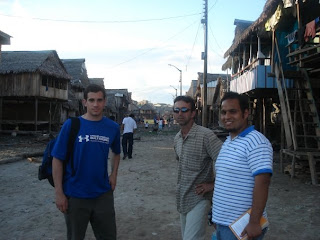

Back at the base, Cecy had made fried rice and french fries for us, which tasted great. The men relaxed and journaled while the women helped lead a women's ministry run through YWAM. A little after 9:00 they wrapped up and we went out to El Zorrito - Parrilladas, a traditional Peruvian restaurant with a glowing grill on the front patio. On the way, our motocar driver took us in a few circles and down bumpy dirt roads with no other vehicles, which concerned us, but eventually he admitted he was lost.

Five minutes later we found our group and sat down to sample their chicken, beef, pork, rice, yucca, cow heart, fish, and palm shavings sprinkled with lime. PR also threw caution to the wind and ordered one pitcher of each of their three beverages, a yellow jungle fruit juice, blue maize juice, and something that tasted like iced coffee with floating lime pods. Everything was great, including the three sauces on the table that I tasted sparingly. We went to the plaza briefly, buying a few last souvenirs, and gave leftover change to a young mother. There are few beggars in Iquitos, perhaps because tourism is still lacking, perhaps because of the low cost of living with accessible natural resources.

 runny oatmeal. They were given seconds, thirds if they wanted, which must have been part of the draw. Jae, Danielle, and I washed, rinsed, and dried respectively the onslaught of bowls, cups, and spoons. Meanwhile in the opposite corner of the kitchen, Cecy and Julio's wife cooked for our team a traditional Peruvian dish of chicken pieces, peppers, onions, black olives, and potatoes in a spicy tomato sauce served over rice, which was one of my favorite meals of the whole trip.
runny oatmeal. They were given seconds, thirds if they wanted, which must have been part of the draw. Jae, Danielle, and I washed, rinsed, and dried respectively the onslaught of bowls, cups, and spoons. Meanwhile in the opposite corner of the kitchen, Cecy and Julio's wife cooked for our team a traditional Peruvian dish of chicken pieces, peppers, onions, black olives, and potatoes in a spicy tomato sauce served over rice, which was one of my favorite meals of the whole trip.
 and waved to our friends. The bus had no windows, just openings, topped with plastic coated with colorful paint, and the floor, windows, and ceiling were all made of wood. At the airport, security was appropriately lax given the far-fetched risk of terror. We thanked Carlos and Osmar for their friendship and hard work before entering the open air waiting area. We heard our incoming jet before it broke through the misty jungle air.
and waved to our friends. The bus had no windows, just openings, topped with plastic coated with colorful paint, and the floor, windows, and ceiling were all made of wood. At the airport, security was appropriately lax given the far-fetched risk of terror. We thanked Carlos and Osmar for their friendship and hard work before entering the open air waiting area. We heard our incoming jet before it broke through the misty jungle air. 













